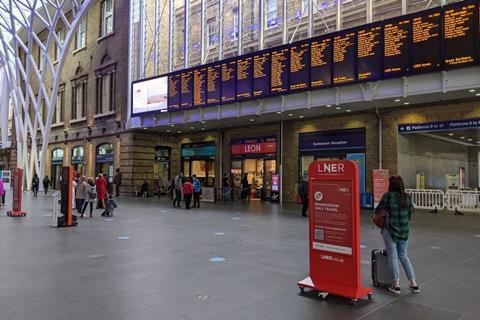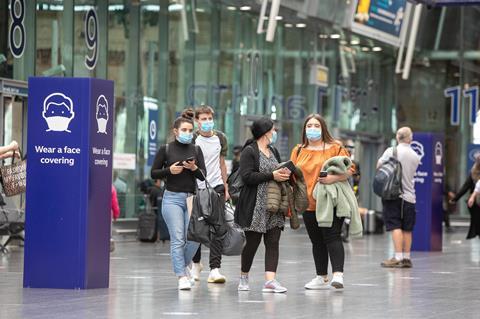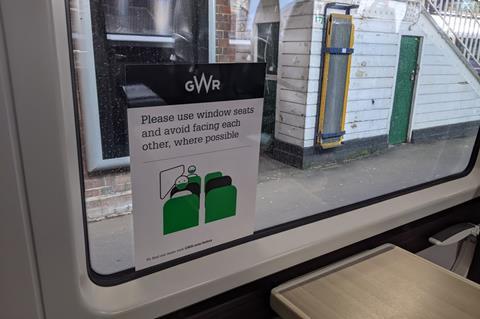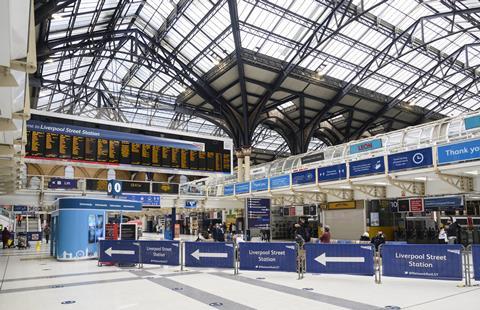
UK: The Rail Industry Recovery Group, which was formed to bring together industry and trade union representatives to identify ways to make the industry more financially sustainable in the light of the coronavirus pandemic, has agreed common principles and focus areas for ‘meaningful discussions’ to address the efficiency and cost savings required.

The enabling framework agreement published on June 15 covers Network Rail, Department for Transport-contracted operators, and the ASLEF, RMT, TSSA and UNITE unions.
The government has provided around £800m/month to enable trains to continue to run during the pandemic, which saw ridership and thus revenue collapse by more than 80% while operating costs remained broadly at pre-pandemic levels with staffing costs making up around 30%. However, the government’s position is that this support is not unlimited or sustainable.
The framework agreement says there is ‘little optimism of a return to former revenues in the short to medium term and some speculate even in the longer term’, leaving a gap in the industry’s finances of around £2bn/year.
Five principles
The agreement sets out five principles and areas of focus:
Employment Security Measures: industry-wide special voluntary severance and redeployment schemes, reskilling and retraining, a freeze on recruitment other than for essential roles, benchmarking of cleaning and catering employment costs to assess potential for in-sourcing, and a commitment to avoid compulsory redundancies.
Investing in People: increasing use of apprenticeships and new training and methods, developing career progression and encouraging employment mobility.
Modern & Inclusive Workforce: ‘modern, agile’ working practices and terms and conditions for existing and new employees, flexible working hours while acknowledging union aspirations for a reduction in the average working week, sustainable industry-wide TOC defined benefit pensions, opportunities for part-time, job-share, flexible and weekend working, and encouraging more applications from women and ethnic minority candidates.
Revising Working Arrangements & Practices: reviewing the basis for future annual pay review discussions, establishing a seven-day railway with ‘robust’ Sunday working arrangements, more flexible and multi-functional passenger service roles at stations and on trains, using modern technology to enhance train operation, reviewing rostering arrangements, updating policies and procedural agreements to align with modern working principles.
Enhanced Ways of Working: changes to roles and duties, flexible working and removal of duplication, introducing new technology without additional payments, redesigning processes and promoting a culture of continuous improvement and removal of outdated practices
Detailed workstream discussions are expected to conclude by October 31, with phased implementation by December 31, although there may be a different timeline for pensions.
| Parties to the Enabling Framework Agreement |
|---|
| Network Rail |
| Avanti West Coast |
| Chiltern Railways |
| CrossCountry |
| East Midlands Railway |
| Essex Thameside (c2c) |
| Gatwick Express |
| Great Western Railway |
| Greater Anglia |
| LNER |
| Northern |
| Southeastern |
| South Western Railway |
| Thameslink, Southern & Great Northern Railways |
| TransPennine Express |
| West Midlands Railway |
| ASLEF |
| RMT |
| TSSA |
| UNITE |
Responses
‘To build back a railway which is sustainable in the long-term and addresses changing passenger needs, we must change the way we work and not take more than our fair share from the public purse’, said Chair of the Rail Delivery Group, Steve Montgomery. ‘Like any industry hit by the pandemic we face tough choices, we have to adapt and we want to retain as many jobs as we can. This agreement between rail companies and trades unions allows for further discussions about how we can create a future for the railway which responds to the changing needs of passengers and supports all parts of the country to thrive as we rebuild.’

Mick Whelan, General Secretary of train drivers’ union ASLEF, said ‘the government is forcing cuts on the railway industry in the wake of the Covid-19 pandemic. We are engaging with the government, the other rail unions, and all the other stakeholders in the rail industry, to protect our members and to protect Britain’s railway.’
The RMT union said it wanted an industry-wide job security agreement which would maintain pay and conditions with no compulsory redundancies. It opposes pay cuts or freezes, wants to defend and improve members’ pensions, and end casualisation, outsourcing, ‘bogus’ self-employment and zero hours contracts. It wants to see activities such as security, cleaning, catering, fleet engineering and infrastructure brought in-house, and is seeking an industry-wide collective agreement that would place all rail workers under a common contract, with full travel facilities and access to the Railways Pension Scheme.

‘We don’t accept the notion that the future of the railways should be based on job cuts and attacks on safety, pay, conditions and pensions’, said General Secretary Mick Lynch.
TSSA General Secretary Manuel Cortes said ‘in return for extensive job security measures, including a no compulsory redundancy policy, our union has agreed to continue engaging in discussions under the auspices of the RIRG. However, make no mistake, we will not tolerate any compulsory redundancies now or in the future. This is our red line.’



